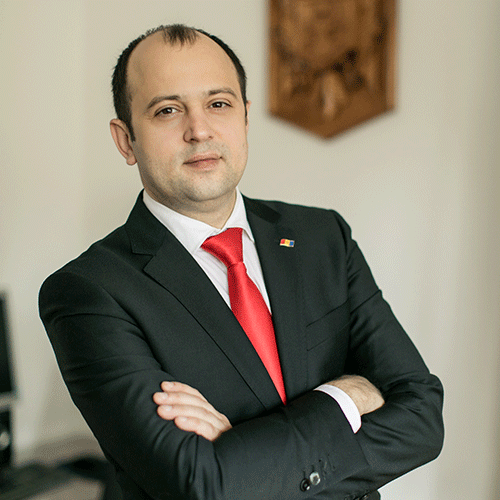

Carrier
2017–Present Vice-president of the Danube Commission, Permanent representative of the Republic of Moldova to the Danube Commission
2016–Present Ambassador Extraordinary and Plenipotentiary of the Republic of Moldova to Hungary, Bosnia and Herzegovina, Republic of Croatia, Republic of Slovenia and Danube Commission
2014–2016 Executive director the Institute for Social Progress and Democracy
2013–2015 Member of the Parliamentary Assembly of Council of Europe
2011–2014 Member of the Parliament of Republic of Moldova, Committee for Culture, Education, Research, Youth, Sports, and Mass Media
2009–2011 Deputy minister, Ministry of Youth and Sports of the Republic of Moldova
2005–2009 Member of the Parliament of Republic of Moldova, Committee for Human Rights
2005–2009 Member of the Parliamentary Assembly of Council of Europe; member of the Political Affairs Committee
2003–2005 International secretary of the National Youth Council of Moldova
2003–2004 Project coordinator – “Facilitation of credit access for young entrepreneurs via informing about micro financial/financial opportunities in Moldova” USAID│BIZPRO Moldova
Studies
1998–2002 University degree in political sciences
State University of Moldova, department of International Relations, Political Sciences and Public Administration, Chișinău (Moldova)
2002–2003 Master degree in political sciences
State University of Moldova, department of International Relations, Political Sciences and Public Administration, Chișinău (Moldova)
Master degree in political management
Post – Academic School “Ovidiu Sincai”, București (Romania)
Abstract
Danube Commission – current situation and strengthening cooperation perspectives
The aim of DC is to ensure that navigation on the Danube is free and open to the nationals, commercial vessels and goods of all states on a footing of equality, acting on the basis of Belgrade Convention on the regime of navigation on the Danube (1948).
An important aspect of the Commission’s activities is the involvement in multilateral cooperation and international projects for inland waterways of European importance, and the introduction of innovative ideas into the practice of Danube navigation. The strengthening of the cooperation and projects cover almost all the main areas of navigation, primarily infrastructure development, to eliminate administrative barriers and reduce special control procedures for vessel traffic. Considering these issues together with the private sector and the competent authorities is particularly relevant for Danube navigation.
The Danube Commission actively interacts with other commissions and organisations – such as the Rhine Commission, the International Commission for the Protection of the Danube River, the Sava Commission and the Moselle Commission, Black See Economic Organisation, (BSEC), European Union etc. – and it has also expanded its contacts with specialized transport associations and unions.
We expect positive results for Danube navigation from this multilateral cooperation. The goals of Priority Area 1 a) of the European Union Strategy for the Danube Region and activities within the Rhine-Danube Corridor Forum continue to be benchmarks for us.
